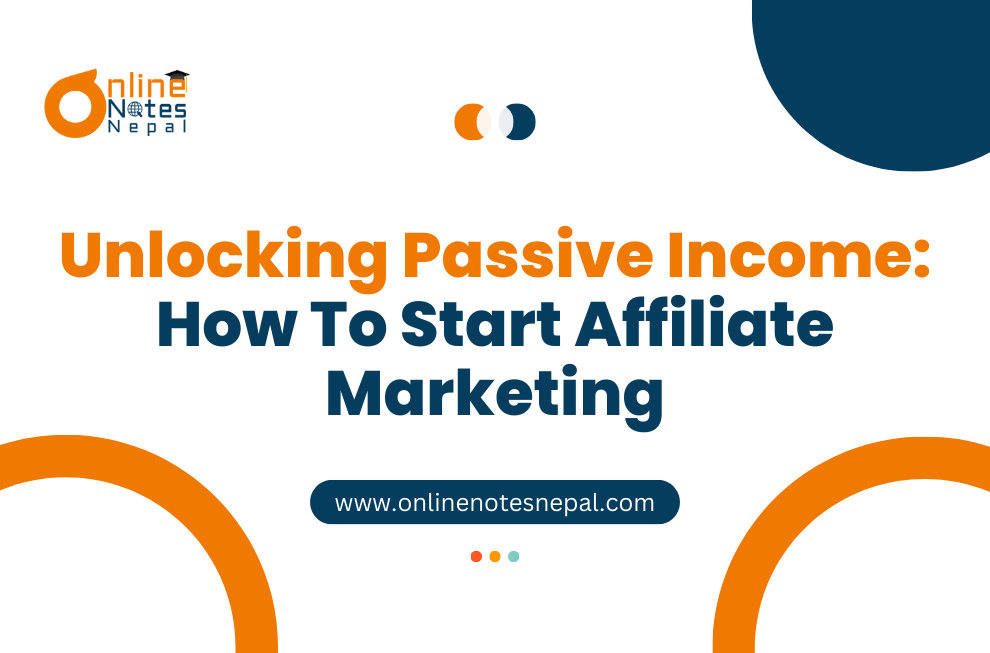Blogs



Unlocking Passive Income: How To Start Affiliate Marketing
FinanceUnlocking Passive Income: How To Start Affiliate Marketing
Affiliate marketing is an effective approach to earn passive income by promoting other people's products or services in exchange for a commission. It's a lucrative potential for anyone with an online presence, whether they're a blogger, social media influencer, YouTuber, or simply someone who wants to share their interest.
3 Types of Affiliate Marketing
1. Unattached affiliate marketing
Unattached affiliate marketing occurs when the affiliate is a broad advertiser or promoter. They are unaffiliated with the affiliated brand, product, industry, or niche and may promote a wide range of affiliate products to a diverse audience. Unaffiliated affiliate marketers frequently utilize pay-per-click (PPC) advertising to attract customers through social media and search engine results pages.
2. Related affiliate marketing
Related affiliate marketing is the technique of promoting products or services that are appropriate for an affiliate's target audience. Affiliates in this category have built a following through content marketing channels such as blogging, YouTube, TikTok, and more. Affiliate marketers who are related to each other may be influencers, providing trustworthy product recommendations.
3. Involved affiliate marketing
Involved affiliate marketing is the creation of content that mentions an affiliated product or service. This could be a product review, a walkthrough, or other content that showcases the product's merits. Many affiliate marketers develop a reputation for providing trustworthy, unbiased product recommendations. Building trust with your audience is a long-term strategy for affiliate marketing success.
Here's a complete guide on getting started.
1. Understand the fundamentals of affiliate marketing.
Affiliate marketing entails collaborating with businesses to promote their products. When someone makes a purchase using your unique affiliate link, you get a commission.
2. Choose Your Niche
Choose a specialization that matches your interests and expertise. This makes it easier to develop content and interact with your audience. Popular categories include health & wellness, technology, personal finance, and lifestyle.
3. Research Affiliate Programs
Look for reliable affiliate networks that provide products or services in your field. Amazon Associates, ClickBank, ShareASale, and Commission Junction are a few of the most popular affiliate networks. Make sure the programs you choose have a strong reputation and provide competitive commissions.
4. Create a platform
Create an online presence where you may share affiliate links. This might be a blog, a YouTube channel, social media pages, or an email newsletter. Concentrate on providing useful content that will entice and interest your target audience.
5. Create Quality Content
Create high-quality, educational, and entertaining material that is valuable to your audience. This could include product reviews, tutorials, comparison articles, and how-to tips. To maximize visibility, ensure that your material is search engine optimized (SEO).
6. Integrate Affiliate Links into Your Website
Make sure that your affiliate links are incorporated into your content in a natural way. Avoid stuffing your material with an excessive amount of links, since this might give the impression of spam and diminish trust. Maintain open communication with your audience regarding the affiliate relationships you have.
7. Drive Traffic to Your Platform
Increase traffic to your platform through various strategies:
- SEO: Optimize your content for search engines to attract organic traffic.
- Social Media: Promote your content on social media platforms to reach a broader audience.
- Email Marketing: Build an email list and send regular newsletters to keep your audience engaged.
- Paid Advertising: Consider using pay-per-click (PPC) advertising to drive targeted traffic to your platform.
8. Track and Analyze Performance
To keep an eye on the effectiveness of your affiliate links and content, use analytics tools. Keep an eye on data like total earnings, conversion rates, and click-through rates (CTR). You can use this data to determine what is effective and what requires improvement.
9. Optimize and Scale
Optimize your strategies to achieve better results based on your performance analysis. Try out various content kinds, advertising strategies, and affiliate networks. As you get expertise and start to see results, think about expanding your efforts by hiring a content creator, looking into other markets, or spending money on sponsored advertising.
10. Stay Updated
Affiliate marketing is a dynamic field. To remain competitive, stay up to date on the newest affiliate program trends, techniques, and developments. To stay informed, participate in affiliate marketing forums, attend seminars, and read industry blogs.
CONCLUSION
By following these steps and consistently producing valuable content, you can build a sustainable passive income stream through affiliate marketing. Remember, success won’t happen overnight, but with dedication and persistence, you can achieve your financial goals.
Affiliate Marketing Pros
- Easy to execute
- Low investment and risk
- Ability to scale
Affiliate Marketing Cons
- Takes time
- Limited control
FAQ
1. How do I start passive income affiliate marketing?
- Find a company and product you want to promote.
- Sign up as an affiliate.
- Get your unique affiliate link and add it to your site.
- A visitor to your website clicks the link, which takes them to a third-party page.
- If the visitor makes a purchase, you receive a commission based on the value of the item purchased.
2. How do I start affiliate marketing with out money?
- Choose your marketing channels.
- Choose a niche.
- Join an affiliate program.
- Use the right keywords.
- Create relevant and engaging content.
- Keep up with audience engagement.
3. Is affiliate marketing considered passive income?
As well as affiliate marketing being one of the truest forms of passive income, it is also possibly one of the easiest forms of passive income to get set up with!
4. Is affiliate marketing difficult?
Affiliate marketing is a skilled practice, and learning the ropes can be a slow, hard slog. So be prepared to spend a lot of time, rather than a lot of money, at the start of your affiliate career.
5. What is the most profitable affiliate?
The most profitable niche for your affiliate marketing business depends on your ability to inspire purchases of a particular type of product, as well as how much businesses are willing to pay to affiliates in that field. Some profitable niches include finance, technology, beauty, and health.


